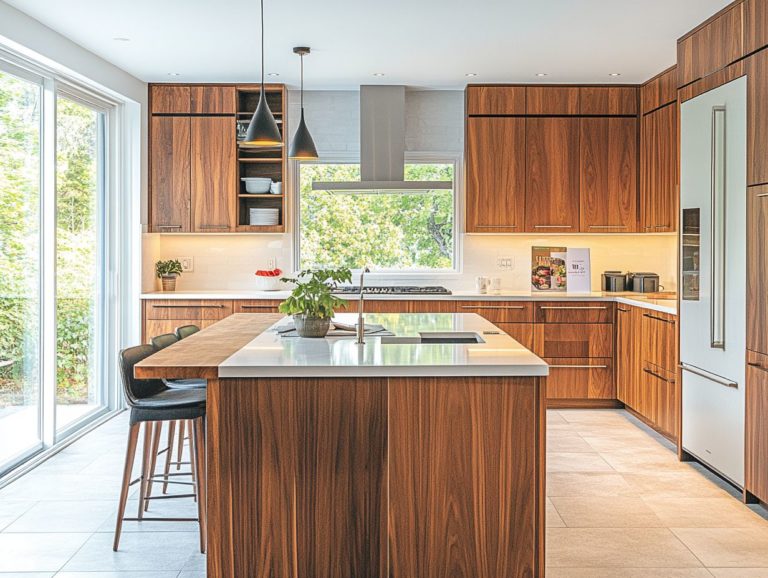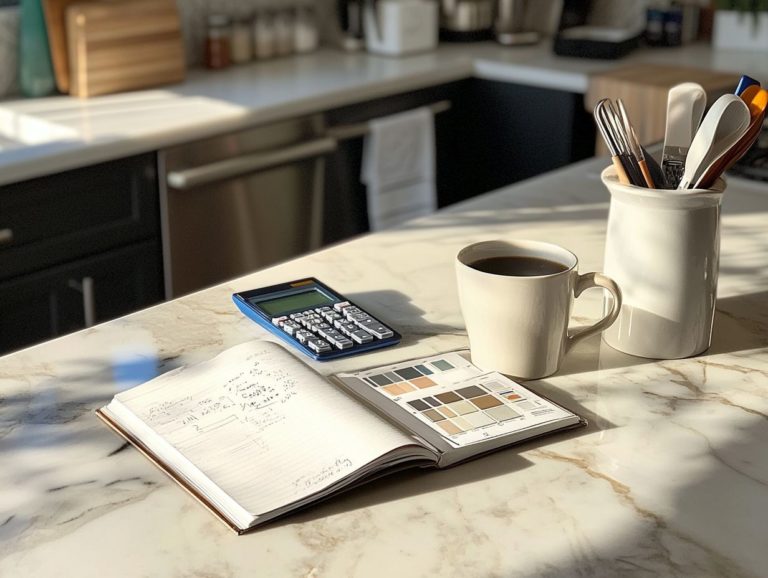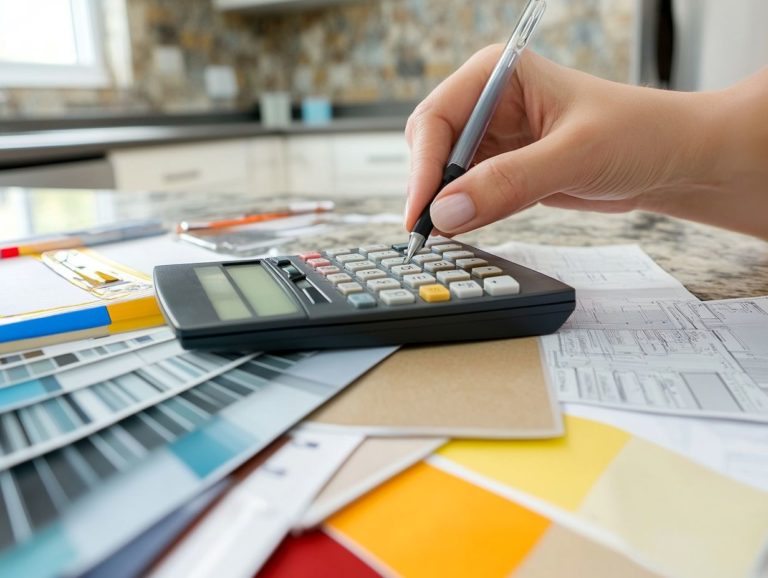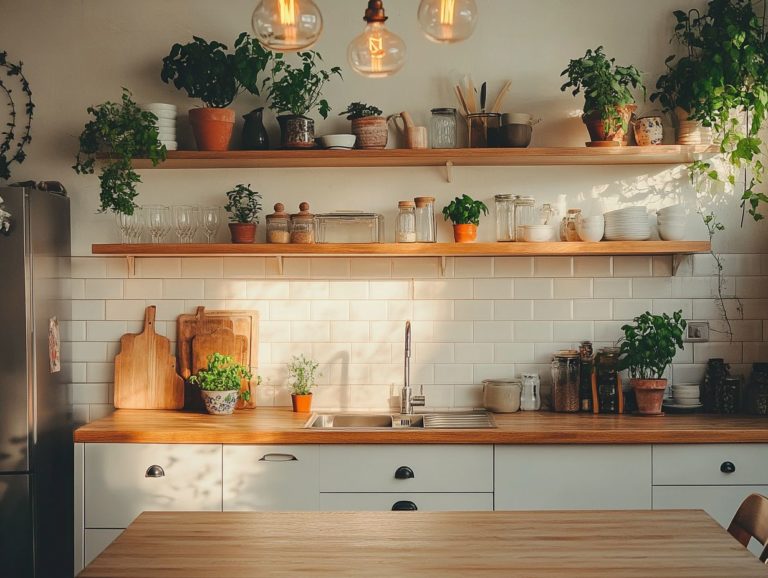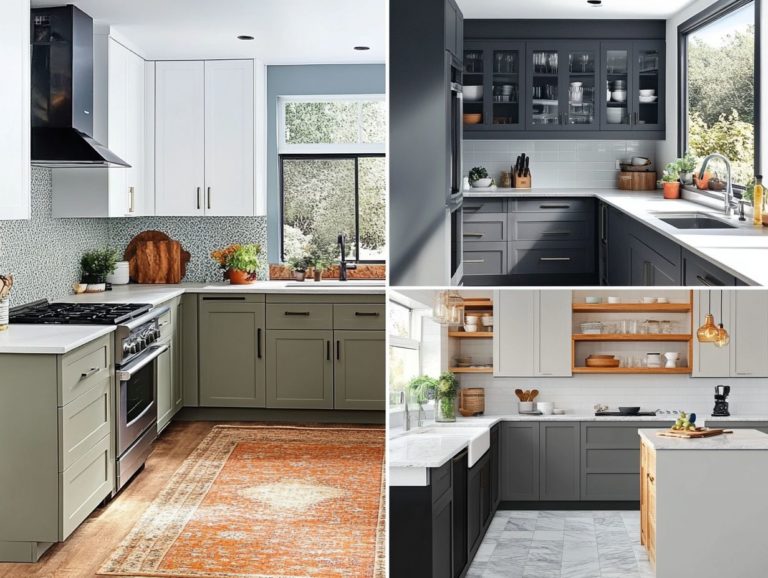How to Create a Flexible Kitchen Remodel Budget
Planning your kitchen remodel? It’s an exciting adventure, but it can have its challenges, especially when it comes to managing your budget.
A well-structured budget is crucial for a successful renovation. It enables you to set aside your funds wisely and avoid unexpected pitfalls. This guide will help you determine your total budget, uncover effective strategies to save costs, and prepare for those unforeseen expenses.
By the end of this process, you’ll have the tools for a flexible budget and be ready to transform your kitchen into the heart of your home.
Contents
- Key Takeaways:
- Understanding Your Budget
- Ways to Save on Kitchen Remodel Costs
- Unexpected Costs to Consider
- Maximizing Your Budget
- Finalizing Your Budget
- Frequently Asked Questions
- What is a flexible kitchen remodel budget?
- Why is it important to create a flexible kitchen remodel budget?
- How do I determine the right budget for my kitchen remodel?
- What are some ways to make a flexible kitchen remodel budget?
- Should I include a contingency fund in my flexible kitchen remodel budget?
- How often should I review and adjust my flexible kitchen remodel budget?
Key Takeaways:

Determine your total budget and set aside funds for each aspect of the remodel.
Consider DIY projects and shopping for deals to save on costs.
Plan for unexpected expenses with a contingency plan and budget for permit and inspection fees.
Understanding Your Budget
Understanding your budget for a kitchen remodel is essential if you’re a California homeowner aiming to enhance your home’s value while keeping your finances in check.
A well-structured budget clarifies renovation costs and influences your choices regarding key elements like appliances, countertops, and custom features that elevate the remodeling experience.
Determining Your Total Budget
Determining your total budget for a kitchen remodel is the first step in a successful renovation. Consider various factors that can influence your costs.
Selecting high-quality materials ensures durability. Hiring skilled labor guarantees a professional finish. Each element plays a crucial role in shaping your financial plan.
Prepare for unexpected expenses that often arise during the renovation process.
By examining these components and setting aside extra money for unexpected expenses, you can make informed decisions that lead to a satisfying and cost-effective kitchen upgrade, transforming your vision into reality.
Allocating Funds for Different Aspects of the Remodel
Effectively allocating funds for your kitchen remodel can profoundly influence the quality and functionality of the final result.
As you plan, it’s crucial to balance your budget among key components like cutting-edge appliances, durable countertops, and efficient storage solutions. Prioritizing these features ensures that your investment enhances both daily usability and visual appeal.
Dedicating a more substantial portion of your budget to high-quality appliances can yield energy savings and superior performance over time.
Investing in stylish and practical countertops will boost both durability and aesthetic charm, creating a warm and inviting atmosphere.
Focusing on smart kitchen storage solutions maximizes available space, making your kitchen more organized and functional for everyone.
Ways to Save on Kitchen Remodel Costs
Finding ways to save on kitchen remodel costs is crucial for homeowners who want to optimize their renovation budget without sacrificing quality.
Consider approaches like DIY projects or negotiating contractor fees to substantially lower your overall expenses while achieving the kitchen design you envision.
In conclusion, remember to plan carefully, prioritize wisely, and stay flexible. Your dream kitchen is within reach!
DIY vs Hiring Professionals

Choosing between a DIY remodel and hiring professionals is a pivotal decision that can significantly impact both the cost and outcome of your kitchen renovation. Each path presents unique advantages and disadvantages that warrant careful consideration.
Opting for a DIY remodel can lead to substantial savings. This option allows you to express your creative vision without the hefty price of professional services.
However, this approach demands a certain level of skill and knowledge. Tasks like plumbing and electrical work can pose significant challenges for those without training.
On the other hand, enlisting professional services means gaining access to experience and expertise. This ensures that your project is executed efficiently and to a high standard.
Yet, keep in mind that their fees can escalate quickly.
Striking a balance between budget and quality is crucial. Skilled contractors can help you expand or refine your project’s scope. Conversely, DIY enthusiasts may need to temper their ambitions to stay within budget.
Shopping for Deals and Discounts
Shopping for deals and discounts can significantly lower the costs associated with your kitchen remodel. This approach gives you the chance to select high-quality appliances and countertops.
To make the most of this strategy, explore various online resources. Price comparison websites and membership-based discount platforms often showcase substantial savings.
Don’t overlook local stores during seasonal sales or clearance events. They can reveal hidden treasures at unbeatable prices.
Subscribing to newsletters from home improvement retailers will give you exclusive access to promotions tailored for kitchen materials.
Participating in communities or forums dedicated to remodeling can uncover recommendations for lesser-known outlet stores. These stores might offer premium products at reduced rates.
This approach allows for a stylish yet budget-friendly kitchen transformation.
Unexpected Costs to Consider
Prepare for unexpected costs! Having a backup plan for unexpected expenses is essential for a smooth remodeling process.
By anticipating additional expenses, such as permit and inspection fees, you can keep your project on track and ensure you meet your dream kitchen timeline.
Contingency Plan for Unforeseen Expenses
A backup plan for unexpected costs is vital during your kitchen remodel. This ensures you manage your budget effectively.
Setting aside a specific percentage of your overall budget—typically around 10-20%—protects you against unexpected costs. This may include structural repairs or sudden material price increases.
Creating a detailed outline of potential risks and corresponding budget allocations gives you the foresight needed to navigate your remodel smoothly. This keeps your financial stability intact.
Ultimately, implementing a well-thought-out plan transforms what feels like an overwhelming project into something manageable.
Permit and Inspection Fees
Permit and inspection fees can drastically affect your renovation budget. The required permits depend on your project type, such as building, electrical, or plumbing.
Check with your local building department for specifics. Understanding these costs upfront helps in drafting a more accurate budget.
It’s wise to set aside extra funds for any unforeseen expenses that may arise during the permitting process.
Maximizing Your Budget

Maximizing your budget for a kitchen remodel is all about selecting cost-effective materials and making informed design choices. These choices elevate both functionality and aesthetics.
By focusing on key areas and investing wisely in appliances and countertops, you can craft a stunning kitchen space that harmonizes with your financial plan. Imagine your dream kitchen! With smart choices, it’s just around the corner.
Choosing Cost-Effective Materials and Designs
Choosing cost-effective materials and designs is a foundational strategy for maximizing your kitchen remodel budget while maintaining quality and style.
Homeowners often discover innovative materials that enhance the aesthetic of their kitchens. These materials also ensure long-lasting durability.
For example, selecting quartz or recycled glass countertops can offer a stunning alternative to traditional granite. This gives you a unique look at a potentially lower cost.
Vinyl flooring has gained popularity for its resilience. It also offers an extensive variety of designs that mimic high-end materials like hardwood or stone. This allows you to achieve that chic vibe without the steep price tag.
By considering these alternatives, you can strike a perfect balance between functionality and fashionable results in your kitchen design.
Prioritizing Areas for Remodeling
Prioritizing areas for remodeling allows you to optimize your budget and ensure that your kitchen remodel addresses your most pressing needs.
By focusing on critical elements like:
- Innovative kitchen storage solutions to maximize space
- Energy-efficient appliances that use less electricity or water, saving you money and reducing your environmental impact
- Upgrading countertops to enhance both durability and aesthetics
You can craft a well-rounded and highly functional kitchen environment. These specific enhancements elevate the kitchen’s appearance and boost its overall efficiency. This makes it a more enjoyable space for daily activities.
Concentrating on these key areas can profoundly transform how your kitchen serves your family, ultimately turning it into the true heart of your home.
Finalizing Your Budget
Finalizing your budget marks the pivotal conclusion of your kitchen remodel planning process. This ensures that every facet of your financial strategy aligns seamlessly with your project scope and aspirations.
At this stage, review and adjust your budget as needed. Prepare for any changes or unforeseen expenses that may come your way.
Revising and Adjusting as Needed
Revising and adjusting your budget is a vital aspect of the kitchen remodeling journey, enabling you to stay on course and make informed financial choices.
By regularly comparing your expenditures to the original budget, you can spot any discrepancies and make necessary adjustments. This meticulous approach aids in controlling costs and ensures that your funds are effectively directed towards essential upgrades or any unexpected repairs that may arise.
It’s important to prioritize adaptability within your financial plans. Market fluctuations and unforeseen expenses can shift your initial projections.
Utilizing budgeting tools or seeking advice from financial management professionals can provide you with a clearer perspective on your project’s financial landscape. This ultimately paves the way for a more successful and satisfying remodeling experience.
Frequently Asked Questions

What is a flexible kitchen remodel budget?
A flexible kitchen remodel budget allows for adjustments throughout the remodeling process. It accounts for unexpected expenses and gives you the option to modify your original plan.
Why is it important to create a flexible kitchen remodel budget?
Creating a flexible kitchen remodel budget is important because it promotes adaptability during the remodeling process. This can help you avoid going over budget and allows for necessary changes without causing major financial strain.
How do I determine the right budget for my kitchen remodel?
To find the right budget for your kitchen remodel, start by deciding how much you want to spend overall. Make a list of necessary expenses like materials and labor.
Don’t forget to consider unexpected costs. It’s wise to add a cushion to your budget for flexibility.
What are some ways to make a flexible kitchen remodel budget?
Prioritize your expenses to create a flexible budget. Identify what you must have and set aside a larger portion for those items.
Research prices for materials and labor. This can help you find the best deals and save money.
Should I include a contingency fund in my flexible kitchen remodel budget?
Yes, including a contingency fund is essential. This fund covers any unexpected expenses that pop up during the remodeling process.
Set aside at least 10-20% of your total budget for this fund. It will give you peace of mind.
How often should I review and adjust my flexible kitchen remodel budget?
Review and adjust your budget regularly throughout the remodeling process. Pay attention if there are significant changes or unexpected expenses.
Staying on top of your budget prevents overspending and helps you make necessary adjustments.

